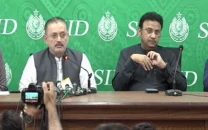Ticking bomb: Experts for awareness, political will to curb population growth
Two-day conference discusses development opportunities, challenges.

Experts for awareness, political will to curb population growth. PHOTO: FILE
The two-day conference, “Pakistan’s Population: New Realities and Challenges for Human Development” was organised by the National University of Sciences and Technology (NUST) in collaboration with the Population Association of Pakistan (PAP).

Speakers at the conference said lack of political will with regard to population issues can be gauged by the fact that no census has been conducted in the country since 1998.
PAP President Shahnaz Wazir Ali said this year’s conference has come at a time when “encouraging as well as disturbing” evidence is available.
She quoted various surveys which showed reproductive health indicators to be increasing, such as the coverage of skilled birth attendants from 39 per cent to 52 per cent, facility-based deliveries from 34 per cent to 48 per cent, total fertility rate falling from 4.1 to 3.8 and life expectancy increasing for both men and women.
The contraceptive prevalence rate in Pakistan has increased marginally from 27 per cent in 2011-12 to 35 per cent in 2012-2013, she said.
“Unfortunately, neonatal mortality continues to remain high, showing a unfortunate resilience to change,” she said.
Demographer Zeba Sathar said “At no point has serious attention been devoted to study large population numbers, their distribution and the implications they hold for the country’s development, politics and stability”.

Federal Minister for Planning, Development and Reforms Ahsan Iqbal said these issues needed to be debated at all levels and a narrative change was required so development becomes the focus and issues do not get brushed under the carpet.
“A huge proportion of our youth is underutilised as either they are unemployed or are working in informal sectors,” said Quaid-i-Azam University Economics School Director Dr Aliya Khan.
Higher Education Commission Acting Chief Imtiaz Hussain Gilani said “Population planning will flow out from education. The more we educate mothers, the more aware they will be of family planning and health issues”.
Dr Tabish Hazir, head of the paediatrics department at Pakistan Institute of Medical Sciences, said owing to poverty, women and children suffer more as they are unable to consume the required nutrients. “A malnourished mother gives birth to a malnourished baby that will ultimately burden the country’s economy.” Malnourished children have weak immune systems which make them vulnerable to childhood disease, resulting in death.
Published in The Express Tribune, November 21st, 2013.


















COMMENTS
Comments are moderated and generally will be posted if they are on-topic and not abusive.
For more information, please see our Comments FAQ